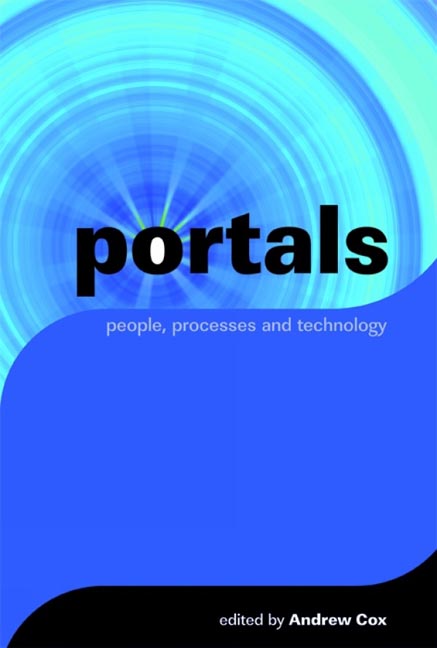Section 4 - Portals in the public sector
Published online by Cambridge University Press: 09 June 2018
Summary
The present UK government's commitment to digital access underlies a significant level of portal activity across the public sector. In the first chapter in this section, Musgrave makes some fundamental points that are surely relevant to portal development in most sectors. He points to the many cultural divides between the agencies involved in creating portals as far more important than purely technical issues. He distinguishes between top-down and bottom-up portal developments, asking how they will get joined up.
Given the culture of publication in universities and the responsibility to share outputs from publicly funded work, it is not surprising that many chapters in this volume have already reflected a perspective strongly influenced by the HE experience. Most of Franklin's comments in Chapter 3 use the university as an example, though doubtless the technologies he is discussing apply as much in other sectors. In Chapter 6 Emmott is writing from an academic perspective – though again he makes an effort to generalize. The fact is that very few can draw from deep cross-sectoral experience. Hopefully this book will stimulate a little more crosssector thinking.
In this section two further chapters draw on university experiences, but surely their conclusions are relevant in many other contexts. Schelleman's beautifully honest account of portal development at one institution gives us a valuable insight into the forces at work in such a complex, far-reaching project. As in Musgrave, people issues seem central. The difficulties encountered should not be attributed to bad will, perhaps not even to the cultural differences that Musgrave identifies, but to the requirement made by a portal for many organizational groups to work together at a deep level for the first time and, of course, to contingent events. Technology changes so fast and a portal project is so big that things are likely to take unpredictable turns. The special difficulties of working in uncharted territory are apparent. Klein is primarily concerned with technology. Her chapter is usefully read alongside Franklin's: both stress single sign-on (SSO) as a core aspect of a portal. Her chapter illustrates another vital point: the importance of opportunistic development – portals are often developed not out of some grand vision, but in response to technological opportunity.
- Type
- Chapter
- Information
- Portalspeople, processes and technology, pp. 147 - 148Publisher: FacetPrint publication year: 2006



